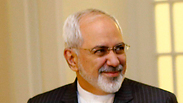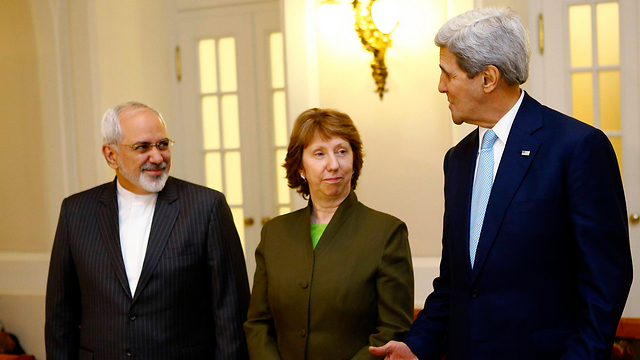
Iran: Failure to reach nuke deal will 'boost radicals, create chaos'
Iran says dies will not be able to make Nov 24 deadline, as top Iranian diplomatic aide says Kerry's presence in talks indicate a shift in US position, warns of 'dangerous results' should talks fail.
Iran warned the world of the dangerous ramification of failing to reach a deal over its disputed nuclear program, only a day ahead of the talks' self-imposed deadline, and with chances of a deal looking slim-to-none.
Ali Khoram, an adviser to Iran’s Foreign Minister Zarif reportedly told the London-based Asharq Al-Awsat that “Failure of the negotiations will inevitably boost radicals on both sides and will create far more chaotic and dangerous results both regionally and internationally,”
The sides are working frantically in Vienna to reach a compromise and reports said in recent days that despite initial plans to return to their home countries, Iran's Zarif and US Secretary of State John Kerry remain in the Austrain capital over the weekend, possibly in a bid to discuss a new proposal. Updated reports from Sunday morning, said Iran says it will not be possible by a November 24 deadline to reach a comprehensive deal.
Despite his warning, Khoram also voiced optimism, saying that “the active presence of Kerry in the last round of Vienna talks seems to indicate that the US has retreated a bit from the unworkable stand it took (last week) and is discussing an alternative, more practical formula for Iran,” the paper reported.
Related stories:
- Iran: We supplied Hezbollah missiles capable of reaching Dimona
- Three days to deadline: 'US, Iran discussing new proposals to break nuclear impasse'
- Iran firm displays US-made helicopters, showing it can evade sanctions
"Considering the short time left until the deadline and number of issues that needed to be discussed and resolved, it is impossible to reach a final and comprehensive deal by Nov. 24," Iran's ISNA quoted an unnamed member of Iran's negotiating team in Vienna as saying.
"The issue of extension of the talks is an option on the table and we will start discussing it if no deal is reached by Sunday night," the person said.
World powers and Iran struggled on Saturday to overcome crucial differences that are preventing them from ending a 12-year standoff over Tehran's atomic ambitions, raising the prospect of another extension to the high-stake talks.
Kerry said "big gaps" remained with two days to go before a self-imposed Nov. 24 deadline for an accord, despite signs of some headway. A European source said the likelihood of a final deal by Monday was "very small".
Diplomats said a framework accord was still possible, but that weeks if not months would then be needed to agree on the all-important details of how it would be implemented.
Powers are pressing Iran to stop stonewalling a UN atomic bomb investigation as part of a wider nuclear accord, but look likely to stop short of demanding full disclosure of any secret weapon work by Tehran to avoid killing an historic deal.
Officially, the United States and its Western allies say it is vital that Iran fully cooperate with a UN nuclear agency investigation if it wants a diplomatic settlement that would end the sanctions severely hurting its oil-based economy.
The six powers face a delicate balancing act at talks in Vienna, due to end by Monday; Israel and hawkish US lawmakers - wary of any rapprochement with old foe Iran - are likely to pounce on a deal if they believe it is too soft on Tehran.
A senior US official stressed that the powers had not changed their position on Iran's past activities during this week's talks: "We've always said that any agreement must resolve the issue to our satisfaction. That has not changed."
Privately, however, some officials acknowledge that Iran may never be prepared to admit to what they believe it was guilty of: covertly working in the past to develop the ability to build a nuclear-armed missile - something it has always denied.
A senior Western official said the six would try to "be creative" in finding a formula to satisfy those who want Iran to come clean about any atomic bomb research and those who say this is simply unrealistic.
If an eventual accord does not put strong pressure on Iran to increase cooperation with the International Atomic Energy Agency (IAEA) by making it a condition for some sanctions relief, it could hurt the IAEA's credibility, some diplomats say.
Reuters contributed to this report











